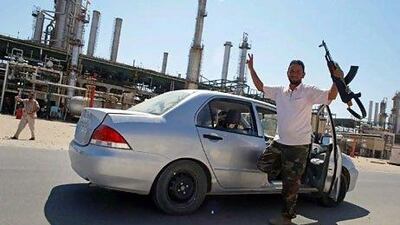Oil giants, banks and property companies are eyeing a quick return to Libya after the fall of Muammar Qaddafi's regime.
Eni, the large Italian oil company with vast interests in Libya, has worked with rebel forces there for weeks to explore restarting production at facilities in the country's east. Those plans are expected to accelerate following the rebels' movement into Tripoli yesterday, and Eni's shares climbed by 7 per cent in midday trading.
In pictures: Celebration erupts as rebels take control of Tripoli
But many companies and analysts still envisage a long period of instability before business improves in a country with Africa's largest oil reserves. Libya's oil output has fallen to about a tenth of pre-conflict levels of 1.6 million barrels per day.
"The political situation remains volatile and risks to current and new businesses will take time to subside," said Ghanem Nuseibeh, a partner at Cornerstone Global Associates and senior analyst with Political Capital.
OMV, an Austrian energy company part-owned by the Abu Dhabi Government through its International Petroleum Investment Company, has said it could resume production six months to a year after the political situation stabilises. Petrofac, the British oil services company, told Bloom-berg News yesterday it hoped to begin work by the end of the year.
"What Libya doesn't face is the same situation as Iraq, where oil infrastructure had been destroyed," said Edward Hobart, the British deputy ambassador to the UAE, who headed the foreign office's Libya desk during the conflict.
BP had been poised to drill its first well in Libya in February.
"We'd intend to resume our activities when conditions allow," said Robert Wine, a BP spokesman in London.
About 100 Libyan employees remain on standby there and 80 foreign staff who had been evacuated could return, he said.
While oil companies have lost the most to the Libyan uprising, banks, property companies and airlines have also been forced to close Libyan businesses and absorb losses.
Two Abu Dhabi banks, National Bank of Abu Dhabi (NBAD) and First Gulf Bank (FGB), both withdrew after sanctions pressures rose.
A spokesman for NBAD said that once Libya was "a stable country, we'll resume operations. We believe that the Libyan people will enjoy stability and we'll be more than happy to resume work and serve our clients there".
NBAD had operated in Libya since 2008, where it made large losses until turning a profit of Dh456,000 (US$124,150) in the first quarter of this year. Its representative office was closed when the civil war began.
Officials at FGB said it was too soon to judge whether the bank would return to Libya.
FGB operated a subsidiary in Libya that had two offices in Tripoli, including a branch in the Rixos hotel near Col Qaddafi's compound. The management agreement for the subsidiary was cancelled earlier this year in compliance with international sanctions.
Airlines and shipping firms are wary of rushing their high-value assets into Libya. Emirates Airline and Qatar Airways both suspended service to Tripoli with the onset of fighting, and are expected to maintain their moratorium until conditions stabilise.
Because of the unrest, Emirates said the suspension of its flights "is indefinite".
The maritime industry is expected to keep the Libyan market at arm's length until a new government is brought in and fighting ends. The beleaguered country has been placed on a list of areas deemed high risk by London's marine insurance market.
"There is no immediate prospect that Libya would be taken off the listed areas if hostilities were declared over," said Neil Roberts, an insurance expert who works as a senior technical executive for the Lloyd's Market Association. "Every situation is different, but underwriters would certainly be looking for a stable period in the country before considering whether to de-list."
CB Richard Ellis, the property consultancy, investigated launching an operation in Libya before the outbreak of the civil war, said Nicholas Maclean, the managing director of the Middle East office.
"Whoever comes into power there is a huge opportunity. There will be all sorts of interest, from this part of the world in particular," he said.
Libya will be able to restart some oil output in a few months, but it will take up to 18 months to reach the prewar level, its former top oil official said yesterday.
Shokri Ghanem, who defected from the government in May, said he hoped the Libyan people would "be able to create a new government that is democratic and respects human rights".
ghunter@thenational.ae
igale@thenational.ae
afitch@thenational.ae

